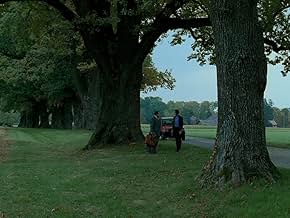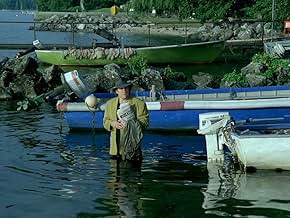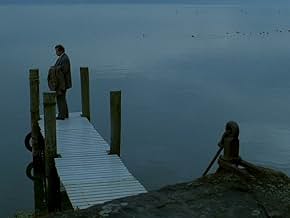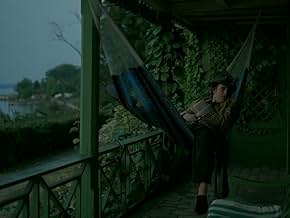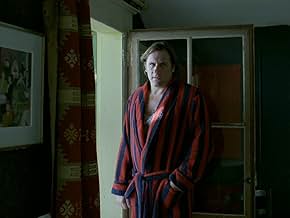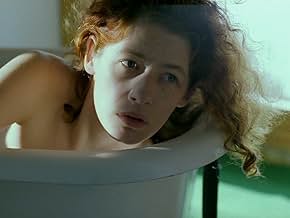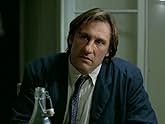IMDb RATING
6.1/10
1.6K
YOUR RATING
Romance about Simon Donnadieu and his decision to leave his ever-loving wife Rachel.Romance about Simon Donnadieu and his decision to leave his ever-loving wife Rachel.Romance about Simon Donnadieu and his decision to leave his ever-loving wife Rachel.
- Awards
- 2 nominations total
- Director
- Writer
- All cast & crew
- Production, box office & more at IMDbPro
Featured reviews
Hélas pour moi 1993 Jean-Luc Godard's rumination on the meaning of it all i.e. creation, it's fruits shown as lovely landscapes; its music with snatches of a variety of masterpieces: as a counterpoint to the inheritors of creation (by accident or design) a rather messy confused lot, as confused as the hybrid god of Zeus and the Christian god of the troika who appears in the body of Simon, wife of Rachael, to experience first hand sexual pleasure (surely anathema to the Christian deity if one is to believe his vicar) in defiance of the death of His belief or at any rate it's gradual dissolution and relegation to a curious relic. Best to enjoy the view and skim the weighty thoughts unless a keen sense of filmic histrionics exists.
Franco-Swiss filmmaker Jean-Luc Godard continues to be an enigma.It is not only the choice of the topics of his films but also the way he films them makes him a puzzling director.'Hélas,Pour Moi'/'Oh,woe is me' is one such film which brings forth the enigmatic as well as recondite nature of his film making techniques.In terms of conventional customs prevalent in the world of cinema,this film makes very little or no sense at all despite having taken the services of some good actors including French super star Gérard Depardieu.The entire film is imbued with a plethora of words which transport viewers to a world of poetry.However,this verbosity becomes an impediment to the film's narrative flow as there is an evident lack of story.It is not so long ago that this same director favored a beginning,a middle and an end in the same film.However, Oh,woe is me suffers enormously from the lack of these elements. This is a big price for a film to pay as despite beautiful locations including trains and ships,this very film has failed to communicate any message to viewers.This is something which every viewer would take with oneself when this film is watched.
Are you easily distracted? When I first watched Gaspar Noé's 2002 film, Irreversible, I sat near the screen and found the cacophony of images overpowering. On my second viewing, I sat further back, more easily contemplating the 'bigger picture,' appreciating a remarkable film. Virginia Woolf's 'Mrs Dalloway,' suggests a similar psychology in her 'stream-of-consciousness' where writing emulates experience: we need to step back before we can tell, what is the pertinent information? what is the story about? In real life, we may only see things in true proportion retrospectively.
This psychological hurdle forcefully confronts us in Hélas Pour Moi. I strongly urge you to see it twice if possible. The story is more logical and flowing when you know what is happening. You can appreciate the many subtleties, and the exquisite cinematography of Caroline Champetier. Failing that, I would recommend sitting at the rear of the auditorium.
We meet a publisher, Abraham Klimt. He has turned detective to investigate a strange story sent to him of divine intervention, though part of the manuscript is missing. We catch up with Klimt as he seeks out Simon and Rachel Donnadieu, our main characters, as well as the one witness who maybe saw the key event: did God take human form to have sex with Rachel, by inhabiting the body of Simon, her husband? We are subject to the same sort of events-discordance, people coming and going, conversations overlapping, as Klimt might, as he searches for truth in an unhelpful environment. This non-sequitur approach goes on for ages, and only in the last 30 minutes or so of footage does the story congeal for a first time viewer.
It re-works a play based on the legend of Zeus, Alcmene and her husband Amphitryon. In the Ancient Greek, the divine Zeus takes the human form of Amphitryon to mate with Amphitryon's betrothed. In the original, this leads to the birth of Heracles, born of divine father and human mother. But in Godard's modern setting, the story just goes as far as sexual union. God, once known as Zeus, now seems more Christian, and by implication can even lead us to question the veracity of the standard Mary-and-Joseph story. Klimt has no preconceptions: he just wants the truth.
There is no strong statement on whether one should believe in divine intervention, or just go for the more obvious explanation: that Simon, although estranged, is feeling horny, he suffers an obsession, and assumes a divine persona which the ever-devoted Rachel believes. "All men are the shadow of God to the women who love them." (We do however, see a low-budget and highly effective scene where God, looking rather scruffy and unkempt, enters Simon's body.) Godard called Hélas pour Moi "a complete flop." Yet, while difficult and obscure, it garnered critically praise and was his first feature to be distributed in the U.S. for ten years. Depardieu (who plays Simon) abandoned the film halfway through shooting, exasperated at Godard's methods. "It could have been a good movie," said Godard, "if Depardieu was willing to try. But he was not interested in the movie, in working to make it right. Of course, he said, 'Godard is a genius.' He was just making it for my name." But without Depardieu, the film would not have been financed.
Hélas pour Moi is replete with dozens of obscure references (from French and Italian literature, from philosophy, from theology) and quotations have sometimes been 'edited' by Godard. This makes it a particularly difficult film even if it wasn't so already. In the jangling, difficult-to-watch first two-thirds, apparently discordant ideas and images are set against the beautiful backdrop of nature and Lake Geneva. Such style is intrinsic to the content. "I feel a strange revulsion at the thought of crudely expressing what the spectator has probably guessed of his own accord," says Klimt, but it could have been from Godard's own lips.
For a while, I wonder if the film will develop into a polemic against religion – no stranger to Godard's virulence – perhaps replacing it with Art as the highest of aspirations. Yet, "there is always something depressing about the portrayal of crude reality," and belief is heralded in what could be interpreted as a positive light when a character asserts, "I believe because it is absurd." When logic fails, after all, we are left with belief. And what is truth? "Truth is what keeps the walls of houses upright, what keeps the roofs from collapsing." This is just one reading. We could view the film as an essay on human feelings. An enquiry into sexual union as an aspect of communicating with God (Rachel likens the gesture of hands in prayer to hands folded in an embrace around one's lover.) Or how an artist seeks meaning in the world. Or we can follow the poetry of Champetier's photography, enjoying the way subjects are framed in nature, focused and de-focused, and the beauty of the moment as a bicycle falls over, or a woman's hat blows off. As a feminist study, or as the way history (and literature) is created and redacted: the French words 'histoire (history) and 'histoires' (stories) being symbiotic for Godard - who entitled his history of cinema 'Histoire(s) du Cinéma.' Metaphysical aspects are drawn together in the opening, and in the final coda, halfway through the credits. These skilfully harmonise Godard's ideas on the nature of perception and the evanescent nature of truth.
"When my father's father's father had a difficult task to accomplish, he went to a certain place in the forest, lit a fire, and immersed himself in silent prayer. And what had to be done was done." The ritual was diluted over time. "But we do know how to tell the story." Never shy at innovation, Godard tells his story in a new, deep and meaningful way.
This psychological hurdle forcefully confronts us in Hélas Pour Moi. I strongly urge you to see it twice if possible. The story is more logical and flowing when you know what is happening. You can appreciate the many subtleties, and the exquisite cinematography of Caroline Champetier. Failing that, I would recommend sitting at the rear of the auditorium.
We meet a publisher, Abraham Klimt. He has turned detective to investigate a strange story sent to him of divine intervention, though part of the manuscript is missing. We catch up with Klimt as he seeks out Simon and Rachel Donnadieu, our main characters, as well as the one witness who maybe saw the key event: did God take human form to have sex with Rachel, by inhabiting the body of Simon, her husband? We are subject to the same sort of events-discordance, people coming and going, conversations overlapping, as Klimt might, as he searches for truth in an unhelpful environment. This non-sequitur approach goes on for ages, and only in the last 30 minutes or so of footage does the story congeal for a first time viewer.
It re-works a play based on the legend of Zeus, Alcmene and her husband Amphitryon. In the Ancient Greek, the divine Zeus takes the human form of Amphitryon to mate with Amphitryon's betrothed. In the original, this leads to the birth of Heracles, born of divine father and human mother. But in Godard's modern setting, the story just goes as far as sexual union. God, once known as Zeus, now seems more Christian, and by implication can even lead us to question the veracity of the standard Mary-and-Joseph story. Klimt has no preconceptions: he just wants the truth.
There is no strong statement on whether one should believe in divine intervention, or just go for the more obvious explanation: that Simon, although estranged, is feeling horny, he suffers an obsession, and assumes a divine persona which the ever-devoted Rachel believes. "All men are the shadow of God to the women who love them." (We do however, see a low-budget and highly effective scene where God, looking rather scruffy and unkempt, enters Simon's body.) Godard called Hélas pour Moi "a complete flop." Yet, while difficult and obscure, it garnered critically praise and was his first feature to be distributed in the U.S. for ten years. Depardieu (who plays Simon) abandoned the film halfway through shooting, exasperated at Godard's methods. "It could have been a good movie," said Godard, "if Depardieu was willing to try. But he was not interested in the movie, in working to make it right. Of course, he said, 'Godard is a genius.' He was just making it for my name." But without Depardieu, the film would not have been financed.
Hélas pour Moi is replete with dozens of obscure references (from French and Italian literature, from philosophy, from theology) and quotations have sometimes been 'edited' by Godard. This makes it a particularly difficult film even if it wasn't so already. In the jangling, difficult-to-watch first two-thirds, apparently discordant ideas and images are set against the beautiful backdrop of nature and Lake Geneva. Such style is intrinsic to the content. "I feel a strange revulsion at the thought of crudely expressing what the spectator has probably guessed of his own accord," says Klimt, but it could have been from Godard's own lips.
For a while, I wonder if the film will develop into a polemic against religion – no stranger to Godard's virulence – perhaps replacing it with Art as the highest of aspirations. Yet, "there is always something depressing about the portrayal of crude reality," and belief is heralded in what could be interpreted as a positive light when a character asserts, "I believe because it is absurd." When logic fails, after all, we are left with belief. And what is truth? "Truth is what keeps the walls of houses upright, what keeps the roofs from collapsing." This is just one reading. We could view the film as an essay on human feelings. An enquiry into sexual union as an aspect of communicating with God (Rachel likens the gesture of hands in prayer to hands folded in an embrace around one's lover.) Or how an artist seeks meaning in the world. Or we can follow the poetry of Champetier's photography, enjoying the way subjects are framed in nature, focused and de-focused, and the beauty of the moment as a bicycle falls over, or a woman's hat blows off. As a feminist study, or as the way history (and literature) is created and redacted: the French words 'histoire (history) and 'histoires' (stories) being symbiotic for Godard - who entitled his history of cinema 'Histoire(s) du Cinéma.' Metaphysical aspects are drawn together in the opening, and in the final coda, halfway through the credits. These skilfully harmonise Godard's ideas on the nature of perception and the evanescent nature of truth.
"When my father's father's father had a difficult task to accomplish, he went to a certain place in the forest, lit a fire, and immersed himself in silent prayer. And what had to be done was done." The ritual was diluted over time. "But we do know how to tell the story." Never shy at innovation, Godard tells his story in a new, deep and meaningful way.
I've just watched it and this is by far the most complex and demanding Godard movie I've seen (I've seen about 15 of his movies now).
Colin Maccabe's introduction on the DVD helped in getting bits and pieces of what was going on. But five minutes in I realized I was again trapped in the idea of (desperately) wanting to find a narrative thread, which only lead to confusion and even frustration.
Then I just decided to let go and try and forget about cinematic restrictions and just let Godard have his way. Obviously in the end (what end?) I still could not get my head around it, but it had quite a lot of impact all the same.
It feels profound and important and confrontational and provoking. It looks beautiful. That suffices for now.
Colin Maccabe's introduction on the DVD helped in getting bits and pieces of what was going on. But five minutes in I realized I was again trapped in the idea of (desperately) wanting to find a narrative thread, which only lead to confusion and even frustration.
Then I just decided to let go and try and forget about cinematic restrictions and just let Godard have his way. Obviously in the end (what end?) I still could not get my head around it, but it had quite a lot of impact all the same.
It feels profound and important and confrontational and provoking. It looks beautiful. That suffices for now.
A romance about Simon Donnadieu (Gerard Depardieu) and his decision to leave his ever-loving wife Rachel (Laurence Masliah).
This film is inspired by the Greek legend of Alcmene and Amphitryon and attempts to show the desire of a god to experience the truth of human desire, suffering and pleasure. The original scenario began with God riding a train through France and Switzerland, observing all the battles of humanity through the window. This sequence required expensive special effects and Godard finally gave up on the idea after visiting a company that demonstrated for him the effects they achieved for Jean-Pierre Jeunet's "Delicatessen".
What strikes me the most about this film is how Godard brought back that creepy voice from "Alphaville". Though there is no clear connection between the two films, I have to wonder why he chose to use that voice. Personally, I find it very unsettling and it jolts a viewer out of the film... which maybe the point.
This film is inspired by the Greek legend of Alcmene and Amphitryon and attempts to show the desire of a god to experience the truth of human desire, suffering and pleasure. The original scenario began with God riding a train through France and Switzerland, observing all the battles of humanity through the window. This sequence required expensive special effects and Godard finally gave up on the idea after visiting a company that demonstrated for him the effects they achieved for Jean-Pierre Jeunet's "Delicatessen".
What strikes me the most about this film is how Godard brought back that creepy voice from "Alphaville". Though there is no clear connection between the two films, I have to wonder why he chose to use that voice. Personally, I find it very unsettling and it jolts a viewer out of the film... which maybe the point.
Did you know
- Quotes
Mechanic: You should say: 'Mr' and 'Mrs." No first names. We're not characters in a novel.
Abraham Klimt: Maybe you are.
- ConnectionsEdited into Histoire(s) du cinéma: Une vague nouvelle (1999)
- How long is Oh, Woe Is Me?Powered by Alexa
Details
Contribute to this page
Suggest an edit or add missing content

